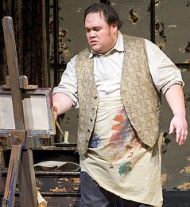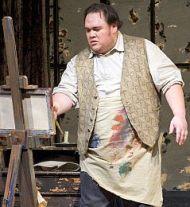
S.F. Opera's
La Bohème
Baritone Quinn Kelsey has a gorgeous voice. It’s large and sonorous, with a distinctive, slightly throaty (aka husky) quality, and a top so beautiful at forte that it could melt the hardest heart. Such a fine instrument, allied to an energetic stage presence, recently made for a most endearing Marcello in San Francisco Opera’s first-cast La Bohème, and an unusually warm, beautiful contribution to Michael Tilson Thomas’ recent San Francisco Symphony performance of Mahler’s Symphony No. 8.
La Bohème
A Merola and Ryan Opera Center alumnus, Kelsey has already assumed more than a dozen roles with Lyric Opera of Chicago, and has sung Schaunard in the Metropolitan Opera’s Bohème. One would hope he’s well on his way. Nonetheless, judging by his performance on Sunday in the Schwabacher Debut Recital Series in Meyer Sanctuary of Temple Emanu-el in San Francisco, not even his gorgeous voice, host of achievements, Richard Tucker Career Grant, and prestigious recitals (under the auspices of the Marilyn Horne Foundation and Washington, D.C.’s Vocal Arts Society) guarantee that he can put a song across.
Kelsey started traditionally, with Handel. As he sang in his native language, his big strong voice and welcome command of coloratura made for a fine “Honour and arms scorn such a foe” from Samson. The wonderful high ending certainly suggested that he was in top form. Switching to a warmer, softer, more refined, and convincingly holy tone, “Vouchsafe, O Lord” from Dettingen te deum hinted at his versatility. And “I rage, I melt, I burn … O ruddier than the cherry” from Acis and Galatea, if a mite monotonous in its repetition, displayed the acting ability that made for such a winning Marcello.
Finding Finzi
Three songs from Finzi’s Let Us Garlands Bring pleased no end with their warmth, beauty, and gorgeous high notes. “It was a lover and his lass,” the last of the three, could have benefited from more swing and folksy abandon, but the set as a whole was a satisfying success.
Once Kelsey abandoned the English language, however, things took a decided downturn. His German pronunciation didn’t seem a major issue in Mahler’s Lieder eines fahrenden Gesellen (Song of a wayfarer), though a German speaker might disagree. Rather, it was a seeming ignorance of what words stood for. Time and again, in all four songs, key phrases were handled inappropriately. In the opening song, “Wenn mein Schatz Hochzeit macht” (When my darling has her wedding day), the line “Weine, wein’ um meinen Schatz” (and weep, weep for my darling) was sung as if love mattered not. As if to compensate, other phrases, including “Lenz is ja vorbei!” (Spring is over), were overemphasized.
Worse, Kelsey completely missed the springlike, folksy innocence at the start of “Ging heut morgen übers Feld” (I walked across the fields in the morning). Without that essential breath of fresh air, the song’s transition to despair at the end fell flat. Kelsey also began to sound far too much like an Italian operatic baritone; his occasional break in the voice and sob seemed out of place in this repertoire. Although he provided an excellent, very dark ending to “Ich hab’ einn glühend Messer” (I have a red-hot knife), the final song sounded far too prosaic.
“Why do they let him sing things like this?” asked the familiar recital-attender seated behind me, at the start of intermission. “Isn’t someone coaching him in what to do?”
Dramatically Underplayed
Mussorgsky’s four Songs and Dances of Death fared even worse. Although my collection of comparisons is limited — one song by Chaliapin, two by Christoff, and complete sets by Podles, Hvorostovsky, and Vishnevskaya — Kelsey’s severely undercharacterized renditions bore scant resemblance to such highly individualized interpretations. Nor was his Russian recognizable. In a performance that only occasionally hinted at the dramatic power of songs in which force of personality is essential (I literally lost attention in the third song, “Trepak”), accompanist Peter Grunberg’s playing proved the highpoint.
The encore, “Some Enchanted Evening” from Rodgers and Hammerstein’s South Pacific, should have shown Kelsey returning to fine form. No such luck. Beyond singing even-tempo to a fault, he was dull. (The song’s originator, Ezio Pinza, admittedly played with tempo less than Siepi, Tozzi, Terfel, and others, but he was in decline and husbanding his resources when he debuted it on Broadway a month before his 59th birthday). Had Kelsey concluded with Handel, the recital might have been far less of a let-down.

